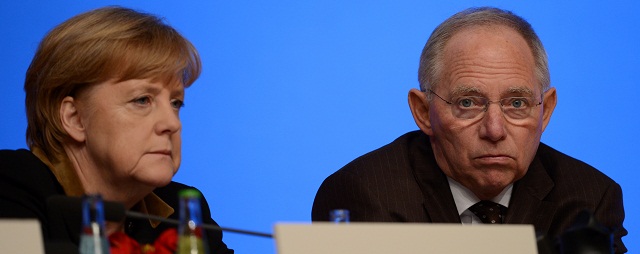As the deadline for setting up the Banking Union gets closer, the more the objective of a swift implementation appears to be out of reach.
The UK is ready to block any plan that comes short of providing it with a close to veto powers over banking rules. Its proposal for a “double majority” voting at the European Banking Authority would deprive the European Central Bank of its current dominant role over a key area for effective supervision. Other non-euro members are pressing for equal say over supervisory decisions, demanding to disregard ECB governing board decisions failing to match the recommendations reached at the committee where all EU members sit. Such an attempt to downgrade the role of the euro central bank is hotly contested by Paris.
But the German objections raised more serious concerns on the Banking Union prospects. The planned supervision over all credit institutions was derided by its Finance minister as straying too far away from reality and indulging in pure fiction. The ECB would prove unable in the coming years to perform such a demanding task. He thus cast a veiled threat that no common supervision was ever to be implemented should its regional banks be included within the scope.
Furthermore he pressed for a clear and detailed split between monetary and banking control tasks inside the ECB, a move likely to lead to protracted discussions over the coming months. Lack of a common understanding between Paris and Berlin might derail the whole project.
Officials in Brussels believe the German position will soften itself at the next week Summit. But Ms Merkel is likely to ask for extra time before the initiative is to be implemented. Delaying it after the general elections due to be held in September would suit her. It would amount to a token price for France and other partners pushing for a swift entry into force of a device they desperately need to support their ailing banks. Yet they are bound to be faced with a higher bill to foot.
Germany intends to deliver a decisive push to the fiscal compact it so forcefully imposed on other members. Its euro plan for the coming months intends to make sure fiscal consolidation is solidly enshrined. Enhanced power would be handed over to the Commission for direct intervention on national budgets and reform measures. Countries are supposed to enter binding commitments on action to take. A most unpalatable prospect for those, like France, that firmly oppose any external meddling in their internal policies.
Germany has also made clear to its partners they must lose all hope about increasing financial solidarity in a foreseeable future. Eurobonds and funds to prevent external shocks are to be shelved for the time being. As a consolation price the meagre EU budget would provide some extra money for investment and jobs.
The outlook doesn’t seem at all promising for a robust European response to the current crisis. Should it be coupled with a fiscal cliff free fall in the US, the ensuing crash might find our leaders engaged in an open rift with their homework still under discussion.






Be the first to comment on "Are we there yet with the Banking Union? The answer is Nein!"